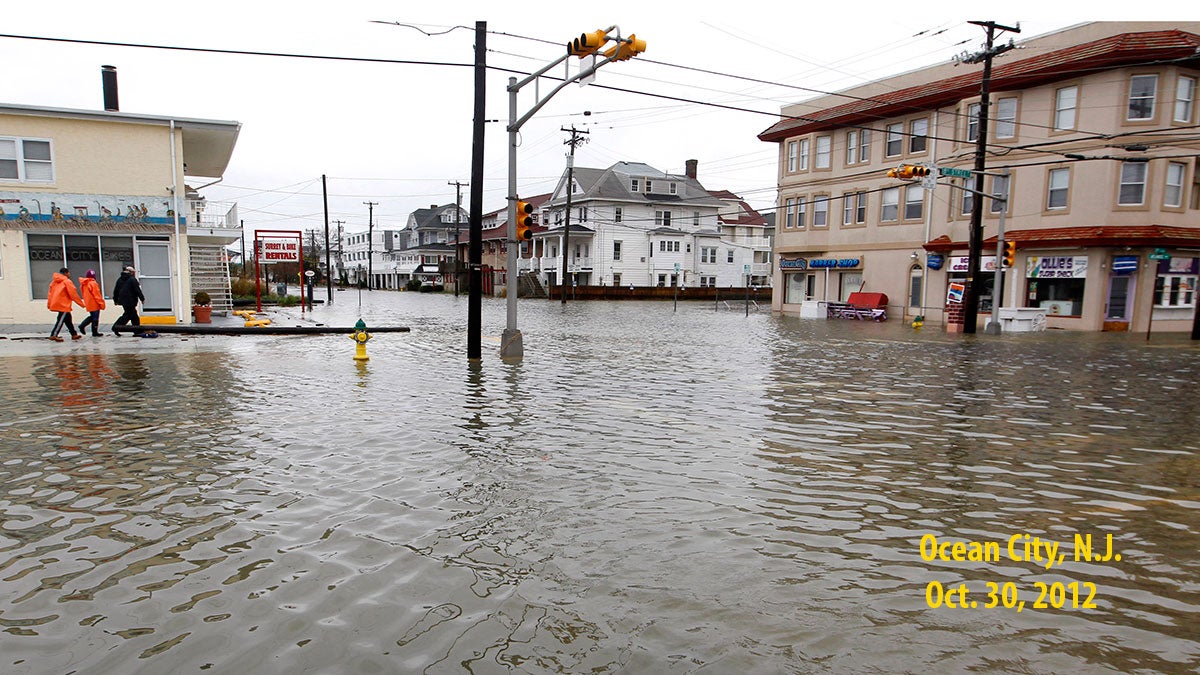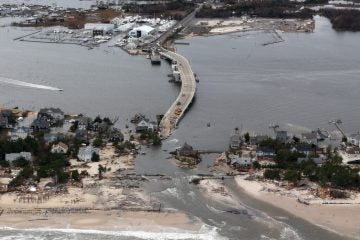With deadline looming, Senators call for revamp of National Flood Insurance system

FILE - In this Oct. 30, 2012 file photo, people walk along a flooded intersection of 8th Street and Atlantic Avenue, in Ocean City, N.J., after the storm surge from Superstorm Sandy flooded much of the town. (AP Photo/Mel Evans, File)
In a deeply partisan period in Washington, New Jersey Sen. Bob Menendez has joined a bi-partisan group of high-profile senators calling for a dramatic overhaul of the National Flood Insurance Policy.
In a press conference on Tuesday, Menendez, a Democrat, joined John Kennedy (R., La.) and Chris Van Hollen (D., Md.) in announcing a new proposal for the National Flood Insurance program, one they say will reduce costs for property owners and increase spending on preventing damage from future floods. The senators signed an opinion piece published in the Wall Street Journal, along with Sens. Marco Rubio (R., Fla.) Elizabeth Warren (D., Mass.) and Thad Cochran (R., Miss.) which called for revamping the federal flood insurance program, saying the current system overcharges and underdelivers. The senators are all from coastal states, and fellow New Jersey Sen. Corey Booker is also signed on as a sponsor for the bill.
The National Flood Insurance Program was established in 1968, as it became increasing difficult to get private flood insurance. The program must be regularly reauthorized, and is set to expire at the end of this summer.
“The Sept. 30 expiration of the law authorizing the NFIP represents an opportunity to address the waste, abuse and mismanagement plaguing the system,” reads part of the WSJ piece. “As members of the Senate Banking and Appropriations committees, which oversee flood insurance and provide federal disaster response, we plan to offer bipartisan landmark legislation to tackle systemic problems with flood insurance and to reframe our entire disaster paradigm.”
According to Menendez, after an unavoidable natural disaster, many homeowners end up facing a man-made disaster, the National Flood Insurance Program. He said premiums continue to rise, even though emergency relief measures were approved in 2014. He said homeowners are pulling out of the system due to increased cost.
The proposed legislation would cap the annual premium increases for flood insurance at 10 percent, and include a voucher program to help some homeowners cover the cost. In also calls for using a high-tech system to update the flood maps the system relies on, and increases spending to prevent future floods.
At the Tuesday press conference, Louisiana’s Kennedy, a first-year Senator best known to national audiences for comparing school choice to the availability of various brands of mayonnaise during a hearing with Education Secretary Betsy DeVos, said at the press conference that he has a lot to disagree about with Menendez and Van Hollen, but that this is one area in which there is bi-partisan support.
“This is incredibly important to my state, but also for New Jersey, for Maryland, in every state,” he said, adding that flooding is not purely a coastal issue. “I don’t care where you live, you get 22 inches of rain in two days, you’re going to flood. And you’re going to need flood insurance.”
Concerns over the National Flood Insurance Program came to the fore in New Jersey after Hurricane Sandy in 2012, but they came earlier to Louisiana, in the wake of Hurricane Katrina. According to Menendez and others, some homeowners in New Jersey are still waiting for final settlement after damage in Sandy.
Menendez argued that there needs to be more investment in flood control.
“Under the current system, FEMA spent more than $277 billion in disaster aid to rebuild communities after floods from 2005 to 2014, but only a fraction of that on efforts to stop or control floodwaters to avert disasters,” reads the Wall Street Journal piece. “Our current system is backward. Rebuilding communities after a disaster is far more expensive than working proactively to reduce or prevent their devastation. FEMA has found that every dollar spent on mitigation generates at least $4 in future savings, and some major federal flood-control projects have seen a return on investment of approximately 54 to 1.”Flood insurance is a complicated topic, involving private industry, local governments and federal regulations, not to mention concerns over rising sea level and the potential impact of global climate change on the frequency and intensity of future storms. A recent report from the National Oceanic and Atmospheric Administration projects flooding to increase considerably in the coming years.
Michael McMahon, the flood insurance specialist for the McMahon Agency, said in a recent interview that flood insurance advocates were looking for a long-term authorization for the next bill. The most recent authorization was for 10 years, in in other instances, the authorization was for a far shorter period. A long-term authorization means more predictability and stability for markets, and makes planning easier for homeowners, he said.
The proposed legislation would authorize the program for six years. At the press conference, Kennedy said that was not as long as they would like, but it gives them a chance to build support for the bill.
The announced bill is not the only option on the table. In April, Sens. Bill Cassidy (R., La.) and Kirsten Gillibrand (D., NY), put forward draft legislation to reauthorize the NFIP for 10 years while seeking to encourage competition by private insurers.
WHYY is your source for fact-based, in-depth journalism and information. As a nonprofit organization, we rely on financial support from readers like you. Please give today.




